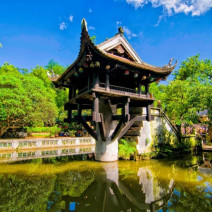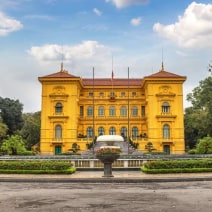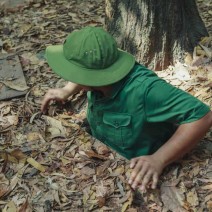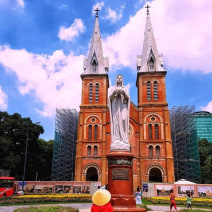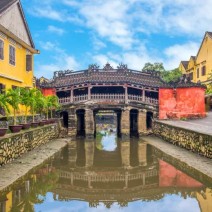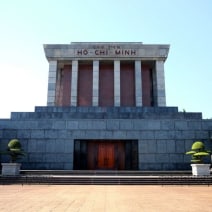Vietnam Travel Guide
Vietnam is a destination which combines culture, history and a land steeped in ancient traditions set against the most beautiful scenic backdrops.
Officially the Socialist Republic of Vietnam, it is the easternmost country on the Indochina Peninsula in Southeast Asia. The country has a population of approximately 97 million, the capital has been Hanoi since the reunification of North and South Vietnam in 1976, while Ho Chi Minh City is the most populous.
Vietnam has a colourful history and the influence from 1000 years of Chinese rule, Imperial dynasties and French Colonisation can still be seen today in its landmarks, cuisine and culture. Ho Chi Minh, the communist revolutionary leader, who played a key role gaining independence and reunifying Vietnam is regarded as a national hero and his legacy continues to shape the political framework. Vietnam might evoke memories of the infamous war however, whilst it was a very significant event which should be acknowledged, there are so many other captivating sights and experiences that are waiting to be uncovered in this stunning country.
We've outlined some general information that may be helpful to you when planning your next holiday to Vietnam.

Time Zone & Currency
The entire country is in the same time zone and is seven hours ahead of Greenwich Mean Time (GMT). The currency in Vietnam is the dong.

Weather in Vietnam
Due to its geographical shape, the climate can vary throughout the country.

Reading For Your Trip To Vietnam
The Quiet American by Graham Greene
Vietnam Rising Dragon by Bill Hayton
Miss Saigon by Claude-Michel Schönberg & Alain Boublil
Best time to go to Vietnam
As you travel from north to South, the weather will vary significantly, so it does depend on the specific regions you plan to visit. From October to April in the central region tropical monsoons can occur and in the north and south it’s from May to September. Throughout the rest of the year, it is almost totally dry in all regions. It can get exceptionally hot, all year round, but the north can be cooler between October and April.
Top Tourist Attractions In Vietnam
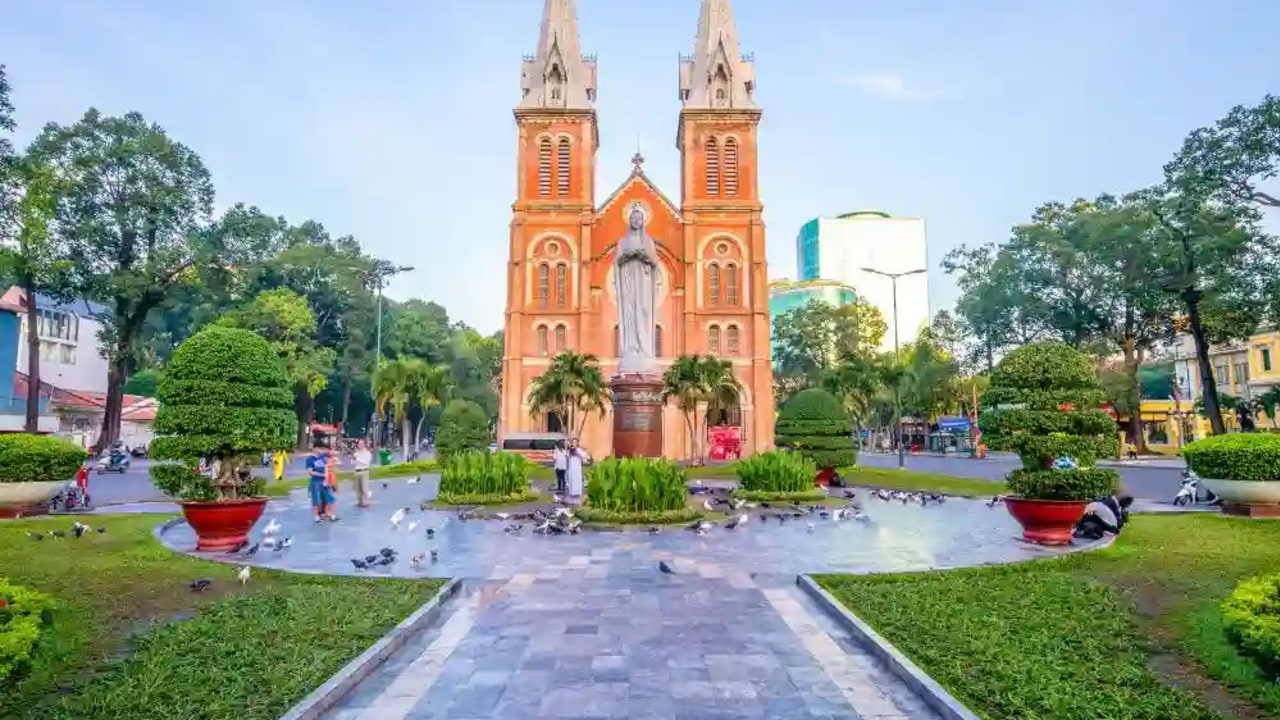
10 things to do in Vietnam
There is a wide range of activities to experience in Vietnam. One of the top landmarks to see in Ho Chi Minh City, is the Saigon Notre Dame Cathedral; a beautiful church built by French colonists.
Food and drink in Vietnam
Vietnamese cuisine is known for its fresh flavours and innovative combinations, with influences from French, Chinese, and Thai cooking. Some must-try dishes include:
- Pho: The nation’s favourite dish – a fragrant noodle soup served with chicken or beef, fresh herbs, and crunchy bean sprouts.
- Banh Mi: A crusty baguette filled with a mix of meats, pickled vegetables, fresh herbs, and chilli sauce, showcasing French colonial influences.
- Spring Rolls: Fresh or fried rolls filled with a mixture of vegetables, herbs, and often shrimp or pork, served with a dipping sauce.
- Bun Cha: Grilled pork served over vermicelli noodles with fresh herbs, lettuce, and a tangy dipping sauce.
- Vietnamese Coffee: Strong, sweet coffee often served with condensed milk or as an iced treat.
Western food is widely available in major tourist areas, but the authentic flavours of Vietnamese cuisine are not to be missed, offering a delightful fusion of freshness and tradition.
Vietnam Travel Guide FAQs
Is Vietnam safe?
The places in Vietnam we will visit are generally safe and our guides will always keep an eye out for you. However, in any large city there can be opportunists and pickpockets. It is wise to be vigilant, especially at busy tourist attractions, and always take good care of your personal belongings. Make use of the safe at your hotel, and carry a photocopy of your passport when out and about. Always take extra care when using public transport. At some tourist sites you may encounter some insistent souvenir sellers. A polite “No, thank you” usually is sufficient. Leave your expensive items at home and always use hotel safety deposit boxes or in-room safes for your valuables.
Can you give a brief history of Vietnam?
Throughout its history Vietnam has had a series of dynasties, foreign rule and infamous conflicts. Around the 3rd century BC the Chinese Qin Dynasty conquered Vietnam and for over 1,000 years Vietnam was under the rule of China until Ngo Quyen defeated their forces in 939AD. Other Vietnamese dynasties then followed, such as Ly, Tran and Le. For a brief period the Ming dynasty from China ruled the country and then power was restored back to Vietnam. Around the 16th century, the first Europeans to visit Vietnam were the Portuguese. In the late 1880s Vietnam became part of French Indochina, along with Laos and Cambodia. The French colonisation of Vietnam had a significant impact on architecture, cuisine and religion and evidence of their rule can still be seen today. When Japan occupied Vietnam in World War II, Ho Chi Minh, the founder of the Communist Party of Vietnam. used this as an opportunity to grow the nationalist movement and gain independence for Vietnam. After the end of WWII, France attempted to control Vietnam again which lead to the First Indochina War (1946-1954). The country was divided into two parts, North Vietnam was communist and South Vietnam wasn't. This division was a contributing factor in the Vietnam war (1955 - 1975), where the U.S.A supported South Vietnam to fight against the North Vietnam communist forces. Inevitably the post Vietnam war period was very difficult. In 1986, the initiation of the economic reforms of 'Doi Moi', which means innovate or renovate, helped to transform Vietnam's economy and the country continues to develop.
Do I need a holiday visa for Vietnam?
All foreign nationals require a visa to enter Vietnam. Your passport must contain two blank pages and be valid for 6 months after your planned departure date. The Vietnam E-visa is valid for a maximum of 30 days for single entry. You must enter and exit Vietnam within the range of dates stated on your visa. Amendments to the visa can be made only when the visa is still valid (a fee applies).
What should I pack for my trip to Vietnam?
Lightweight cottons are the most comfortable clothing in Vietnam. A light raincoat is a good idea in the rainy season. It is advisable to cover arms and legs in the evenings, to protect against mosquito bites. An umbrella is also useful in both the hot and rainy seasons as it will offer protection from both the strong sun and the tropical downpours. Evenings in the north and the central regions can be quite chilly so bring a sweater and a good jacket, especially from November to February. Take cover-up clothing for visits to monasteries or pagodas.
Can I drink the tap water in Vietnam?
It is not advisable to drink tap water. Ice is generally okay in good standard hotels and restaurants but it is best to avoid it at street stalls or in rural areas. Some minor stomach problems are always possible when travelling in exotic countries, so bring a supply of your usual anti-diarrhoea medicine.
What’s the etiquette for tipping in restaurants while in Vietnam?
Tipping in Vietnam for good service is not expected but is always appreciated.
What kind of plugs / sockets are used in Vietnam?
We suggest packing a universal plug adaptor as the standard electrical supply in Vietnam is 220V. Both flat and round two-pin outlets are used throughout the country.
Useful Links
- For up-to-date information regarding entry into Vietnam please see: www.gov.uk
- Official Vietnam Tourism Board: vietnam.travel
